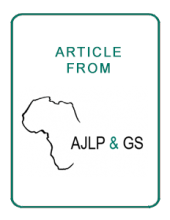Land Library
Bienvenue dans la bibliothèque du Land Portal. Explorez notre vaste collection de ressources en libre accès (plus de 74 000), comprenant des rapports, des articles scientifiques, des articles de recherche, des publications évaluées par des pairs, des documents juridiques, des vidéos et bien plus encore.
/ library resources
Showing items 1 through 9 of 15.There is little information concerning how people in the Global South perceive the benefits and costs associated with urban green areas. There is even less information on how governance influences the way people value these highly complex socio-ecological systems.
Rapid urban population growth and spatial expansion of urban centers have brought unprecedented demand for land in developing countries such as Ethiopia.
Existing land governance system in Zimbabwe subjects vulnerable groups such as women to ‘land corruption’, which entrenches the already existing gendered land inequalities.
Land titles registration is germane to providing proof of individual ownership of land. In recognition of its importance in enhancing property rights, efforts at improving land title registration has increased significantly.
ABSTRACT Urban land in Zimbabwe is a lucrative economic and thus political asset.
This study was on mitigating land corruption through computerisation of land governance activities that include land use planning, cadastral surveying, servicing of land, land allocation, land registration and titling and land development.
This paper underscores that corruption remains of key concern to land governance institutions in Africa, escalates costs of doing business and therefore undermines investments.
Notre article porte sur les pratiques de corruption liées aux opérations de lotissement dans le District de Bamako, plus précisément dans la commune VI.
In Zambia, security of tenure for communities residing under customary land tenure settings has in recent years increasingly come under threat owing to the pressures of high rate of urbanization, speculation, subdivision and conversion to state land, which effectively excludes marginal population


